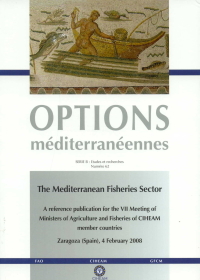| Article précédent | p. 97-105 | Article suivant |
Recreational maritime fishing in the Balearic Islands: tradition and future
The Balearic Islands are the region of Spain in which recreational maritime fishing has the longeststanding tradition, social relevance and economic importance. There are about 70,000 recreational fishermen (8% of the population) that practise more than 60 different techniques, predominantly from a boat (63%) followed by coastal angling (33%). Submarine fishing, even though it is practised by a minority (4%), has a large impact on the coastal fauna. Although annual catches from recreational fishing (1200 t) are about 25% of those of the professional fleet, it is estimated that they generate an added value 4 times higher; meaning that for each kilo of fish caught, recreational fishing generates an added value 16 times higher than professional fishing. The economic, social and environmental implications of this fact are taken firmly into account in the management of the region's fishery resources. For several years, the regional Government has been implementing a series of innovative measures (vessel licences, specific close seasons, marine reserves, non-fishing days, etc.), that could serve as a sustainable management experience applicable to many other areas of the Western Mediterranean. With a view to the future, it is still necessary to apply new formulas of selective fishing, such as the introduction of minimum hook sizes, but moreover it is important to improve information and training of recreational fishermen on sustainability issues and to involve them in the management.
Les îles Baléares sont la région d'Espagne dans laquelle la pêche récréative maritime possède la plus longue tradition, ainsi que la plus grande importance sociale et économique. Il existe environ 70 000 pêcheurs sportifs (8% de la population) qui pratiquent plus de 60 techniques différentes, au premier rang la pêche à partir d'une embarcation (63%) suivie par la pêche à la ligne côtière (33%). La pêche sous-marine, même si elle n'est pratiquée que par une minorité (4%), cause un grand impact sur la faune littorale. Bien que les prises annuelles de la pêche récréative (1200 t) ne représentent que 25% environ de celles de la flotte professionnelle, on estime qu'elles apportent une valeur ajoutée 4 fois plus grande ; ce qui signifie que pour chaque kilo de poisson pris, la pêche sportive crée une valeur ajoutée 16 fois supérieure à celle de la pêche professionnelle. Les implications économiques, sociales et environnementales de ce constat sont strictement prises en considération dans la gestion des ressources halieutiques de la région. Pendant plusieurs années, le gouvernement régional a mis en place une série de mesures innovantes (licences pour les bateaux, saisons spécifiques d'interdiction de pêche, réserves marines, jours d'interdiction de pêche, etc.), qui pourrait servir en tant qu'expérience de gestion durable applicable à plusieurs autres zones de la Méditerranée occidentale. Pour l'avenir, il sera encore nécessaire d'appliquer de nouvelles formules de pêche sélective, telles que l'introduction de tailles minimales d'hameçons, mais surtout il est important d'améliorer l'information et la formation des pêcheurs sportifs quant aux questions de durabilité et de les impliquer dans la gestion.
- [ Afficher ]
- [ Télécharger ]
- [ Exporter la citation ]
Vous pouvez télécharger la citation au format :
- [ Imprimer ]
-
Mots-clés
ILES BALEARES, IMPACT SUR L'ENVIRONNEMENT, LOISIR, METHODE DE PECHE, PECHE A LA LIGNE, PECHE EN PLONGEE, PECHE MARITIMECiter cet article
Grau A.M. Recreational maritime fishing in the Balearic Islands: tradition and future. In : Basurco B. (ed.). The Mediterranean fisheries sector. A reference publication for the VII meeting of Ministers of agriculture and fisheries of CIHEAM member countries (Zaragoza, Spain, 4 february 2008). Zaragoza : CIHEAM / FAO / GFCM, 2008. p. 97-105. (Options Méditerranéennes : Série B. Etudes et Recherches; n. 62). 7. Meeting of Ministers of Agriculture and Fisheries of CIHEAM Member Countries, 2008/02/04, Zaragoza (Spain). http://om.ciheam.org/om/pdf/b62/00800740.pdf



